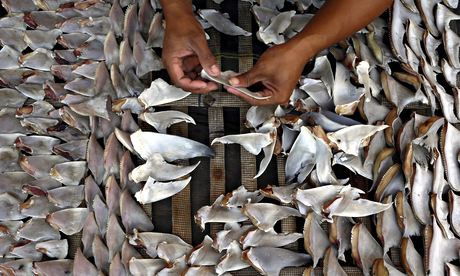
Date: 2025-04-03 Page is: DBtxt003.php txt00007356
Fisheries
International abusers
Fisheries in Africa are losing billions due to illegal practices ... 'Ocean-grabbing' threatens the lives of tens of thousands of fishermen, warns the 2014 Africa Progress report
Burgess COMMENTARY
Peter Burgess
Fisheries in Africa are losing billions due to illegal practices 'Ocean-grabbing' threatens the lives of tens of thousands of fishermen, warns the 2014 Africa Progress report

Shark fin trading in Indramayu ...
Most of the vessels carrying out illegal fishing practices off Africa have been traced to east Asia, South Korea and Russia. Photograph: Mast Irham/EPA
Africa is losing billions to illegal and shadowy practices in fishing, according to the Africa Progress Report published on Thursday.
Tens of thousands of artisanal fishermen in Africa now feel their livelihood is under threat. 'Families have lived off fish for generations ... we used to be able to save a bit for our children's education or to fix our boats but it has now become harder to make ends meet,' says Issa Fall, a member of the Fisherman Committee in Senegal.
While the waters of the Atlantic ocean around West Africa are one of the world's richest fishing grounds, income is declining. This is due to the rise of illegal and unregulated fishing by commercial fleets from other countries.
This problem is not unique to Africa. There are currently 12 million small-scale fishermen across the world who derive vital income from fisheries. The report published today further highlights the rise of 'ocean-grabbing', the practice of pirating fish from the shores of developing countries, and the lack of global success in preserving small scale fisheries.
''Ocean-grabbing' – in the shape of shady access agreements, unreported catch, incursions into protected waters, and the diversion of resources away from local populations – can be as serious a threat as 'land-grabbing',' says Olivier De Schutter, former UN special rapporteur on the right to food, in a report on fisheries and food rights.
'This is a global issue: 60% of the vessels which are carrying out these practices have been traced to east Asia, south Korea and Russia, among others,' says Max Jarrett, deputy executive director of the Africa Progress Panel (APP).
'What's particularly disturbing is that many of these countries are giving aid to African fisheries while also pirating fish illegally on a large scale.'
Research estimates that 'ocean-grabbing' across the world costs between $10bn and $23.5bn (£5.6bn-£14bn) per year, representing between 11 to 12 million tons of fish. Developing countries are thought to be most at risk from illegal fishing, with total estimated catches in west Africa being 40% higher than reported catches.
'The depletion of fish stocks, the degradation of marine environments and the encroachment of industrial fleets pose a major existential threat to these traditional fishing communities,' says De Schutter in an article for the network.
So whose responsibility is it to help prevent ocean-grabbing in developing nations? Herman Kumara, as national fisheries advocate, blames corruption between governments and the private sector: 'A number of top-level ministers and politicians receive commission from the private companies fishing and parking their vessels in Sri Lankan waters, so they don't care that the livelihood of their own fisher people is under threat.'
Meanwhile Jarrett is more pragmatic, and describes the role of different stakeholders:
Research highlights a variety of solutions to tackle these illegal fishing practices, but in his piece De Schutter also makes some recommendations:'The responsibility lies with both the local communities, local governments and international community. The way the current system is structured simply allows it to happen, and allows people to exploit loopholes in that system.'
Despite the scale of the challenge, and the rising levels of ocean-grabbing in developing nations, today's report highlights the plight of Africa, and potential solutions to combating this issue – which provides a stepping stone to combating global inequality.'A dual approach must be taken that not only clamps down on harmful industrial practices, but also actively supports small-scale, artisanal fishers so that they do not have to leave their fishing grounds.'
Speaking from the Sri Lankan experience, Kumara sums up the future role of fishing in development: 'Research tells us that it's the small-scale food producers who feed the world, and not big industries. We need to promote and protect them, and the environment, to ensure they continue to be able to do this.'
Read more stories like this:
• How development organisations can tackle the fisheries challenge
• Could aquaculture solve Africa's fishing crisis?
• People first: green goals should not override ending hunger